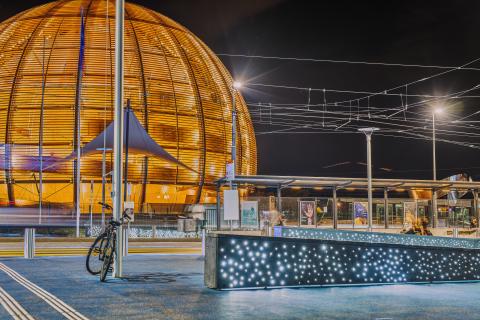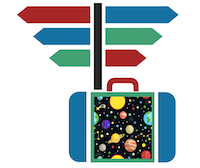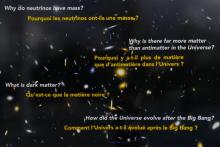Passed by these 4 questions an indefinite number of times, as they stand on the way to the CERN Globe of Innovation and, behind it, the ATLAS experiment site. Before COVID-19, of course ...
I've now been more than 50 days away from my two offices, at CERN and in LAPP. During these days, details of home life had the priority, as well as keeping a close and efficient contact with colleagues. Today, May 11 2020, France reopens slowly and I know that I still have ~16 weeks to go before being allowed to enter sites. With plenty of time to "think global", and in particular reply to a request received from an artist friend in Bogota : can you comment and provide a selection of links on these 4 themes ?
The list below is a personal choice of seeds, which will evolve with time. I just hope that it will inspire and motivate students to explore further... and eventually feed their creativity. As, generally speaking, the answer to those questions is : we have no idea :-)
Why do neutrinos have mass ?
- First answers, by symmetry magazine
- Why I love neutrinos ? a set of videos where scientists also speak about ice cream & other cool stuff
- Masses & oscillations a 2018 physics slam sets the picture that lead to a Nobel prize
- Italy : hunting for Neutrinos looks back at a story with starts in 1930, with W Pauli and B Pontecorvo
- Japan : 50 years of top level discoveries at the iconic Kamiokande
- USA : Neutrinos, Nature's Identity Thieves ? is one of the excellent Don Lincoln's Fermilab videos
- South Pole : Why neutrino matter ? a TED-ed animation on the spectacular IceCube observatory
- France : is the neutrino its own anti-particle ? SuperNemo, hiding under a mountain, is worth poem
- The Antineutrino Global Map project produced in 2015 a map of "geo-neutrinos", either produced by earth natural radioactivity... or in reactors.
Why is there far more matter than antimatter in the universe ?
Why antimatter matters by LHCb scientist Tara Shears & what happened to antimatter by Rolf Landua.
- Antimatter in the lab : the AD, a unique factory visited by Physics Girl
- Antimatter in the cosmos : a new cosmic data-taking for the AMS experiment
The physicist Andrei Sakharov established 3 conditions to generate today's asymmetric universe from a symmetric Big Bang. One is to observe and measure CP violation :
- LHCb, the beauty experiment, focusses on B mesons and Charmed quarks.
- ATLAS and CMS scrutinise the Higgs boson properties.
- This is not enough, we need new physics or new ideas explains John Doyle
- Hot from the press : neutrinos may play their part ?! Confirmation will need a new generation of gigantic detectors.
- Inspiration / ArtSci ? Facebook live with AD expert Michael Doser & Arts.at.cern curator Monica Bello (Zagreb, June 2020)
What is dark matter ?
Dark matter observation and search requires the combination of very different techniques, which makes it particularly exciting:
- The reason why this question is part of CERN program is that it is a very hot topic at LHC: the dark side of the universe, by Tara Shears, is one of the many TED talks on Dark Matter which connects the cosmos and LHC research.
- In Why dark matter matters Ben McAllister discusses beautifully totally different search methods. The online Symmetry magazine lists several in its Dark Matter 101
I'm less familiar with the astronomy part of it, but found a few references on stars/galaxies movements (where the whole issue started) and cosmology. The list will grow here:
- Back to TED-ed : Explaining a star's speed
- Dark matter is driving the evolution of the cosmos: a Perimeter Institute public talk by @AstroKatie
How did the universe evolve after the big bang ?
The reason why this question stands in front of a collider laboratory is nicely illustrated in this (TED-ed) beginning of the universe for beginners. Other possible starting points are for example Brian Cox's (kind of old but immensely popular) Tour of ATLAS or @AstroKatie's Tour of the Universe
Out of the resources that flourished during COVID-19, many were discussing the universe. The Perimeter Institute, in Canada, lets you travel the universe without leaving home through their twitter account [link] and provides a quasi infinite list of resources. Among their selection of physics podcasts links, one of my favourite discusses the cosmos expansion [ may be a bit more technical than other links ]
Obviously, one can also wonder how the universe story continues ? A key player here is the Dark Energy, as explained in a TED-ed talk on death of the universe. @AstroKatie, in a longer and hence more detailed talk, discusses the link between the Higgs boson discovery at the LHC and the universe stability .
Among the online resources offered by the San Francisco Exploratorium, the video shedding light on dark energy illustrates with one example the role of experiments to pin down possible theories. Others look at:
- Cosmic neutrinos: Super-Kamiokande (Japan) and soon DUNE (USA)
- Ultra high energy gamma rays: H.E.S.S. (Namibia) and soon CTA (Spain, Chile) telescopes
- Systematic space survey: Vera Rubin telescope (previously known as LSST)
- Gravitational waves: LIGO (USA), VIRGO (Italy), KAGRA (Japan) and in future the Einstein telescope (?)
- Cosmic microwave background


